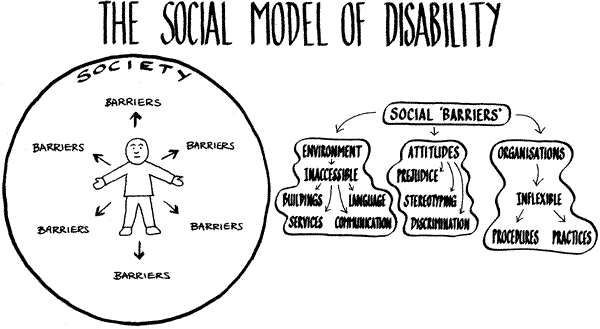~By Andrea LaMarre [email protected]
This blog post takes the form of an interview with recent social psychology PhD graduate, Julie Dachez. Julie was diagnosed with Asperger’s syndrome at the age of 27 and has been an activist ever since. She has just earned a doctoral degree in Social Psychology (“Another way of looking at autism: a psychosocial approach”). She is the author of the blog emoiemoietmoi.over-blog.com and of the graphic novel “La différence invisible”. She holds conferences all around France about autism and the pathologising of difference and has recently been named personality of the year by a french newspaper. Andrea interviewed Julie by email over the course of December about the experience of doing critical research on Aspergers in an environment not always open to critical perspectives.

Image from The Medical Model of Disability: https://ddsg.org.uk/taxi/medical-model.html
- What was the topic of your doctoral dissertation and some of your main findings?
My thesis examines autism from the standpoint of social psychology. In my first study I validated a multidimensional scale for measuring attitudes toward autism in a Francophone context. I used this scale in my second study to analyse the impact that viewing an educational message about a peer-aged high-functioning autistic had on young adults. 104 young adults viewed this message either as a recorded voiceover on a video or live; the message was given, in both cases, by an actor pretending to be an autistic adult. I compared survey responses between those who viewed the video and a control group. Participants who were in the live viewing condition had significantly more positive attitudes toward autistic people. In the third study, I surveyed 206 participants to determine the effect of being in contact with people with autism on social representations of autism. The results confirm that there is indeed a social representation of autism: autism is framed as a disease in which a silent person is stuck in a bubble. While both groups’ representations had similar themes, but were not organized in the same way: social representation of autism is less structured for the group who did not have contact with a person with autism. Finally, the fourth study was dedicated to studying the coping strategies employed by ASD adults. I conducted semi-structured interviews with 31 adults with autism. I identified eight coping strategies: special interests, militant behaviour, diagnosis, seeking help from atypical friends, seeking comfort from animals, normalisation, intellectualisation, and humour. This study allowed me to propose a new approach in which special interests are seen as resources rather than symptoms.
- How do you relate personally to your topic?
I was diagnosed with Asperger’s syndrome - a mild form of autism - at the age of 27. I have been an advocate ever since. Autism has never caused me any pain or suffering, but enduring the stigma and social exclusion and facing the societal pressure to conform to non-autistic behaviors definitely did. That is why we should spend less time trying to “cure” autism, and more trying to reform our society. Researchers should encourage an interdisciplinary approach (conducting research in anthropology, sociology and social psychology for instance) instead of almost solely focusing on the symptoms, treatments and causes of autism.
- In what way did you try to be reflexive about this relationship to your topic of study in your work?
On the one hand, I knew that my research could benefit from my personal experiences and my close relation with the autistic community; on the other hand, I didn’t want my thesis to become a personal and/or political vendetta. Being a part of my own research, it was obvious my own feelings and opinions would colour my thoughts/reflection, but I didn’t want them to overtake my work. There is no easy way to find the right balance, and I found myself struggling at times. But, I think it’s very interesting to be given the opportunity to challenge the myth of the impartial researcher. Indeed, any researcher in social sciences IS a part of the world they are studying, and is bound to develop an intimate relationship with their work. So being a bit provocative, I would say that to a certain extent, your question concerns us all.
- What kind of reaction did you receive from members of your committee?
In the discussion of my doctoral dissertation I tried to explain that we could consider that it is in fact the system in which we live in (neoliberalism) that is pathological and pathogenic, and that people with autism - because they are resistant to social norms - may very well be the sanest of all people. I wanted to nourish the debate about the pathologising of difference. Reversing the stigma was a bold move, and it caused quite a debate during my oral examination: two members of the jury (out of 5) insisted I had to rewrite my discussion entirely. The thing is, I live in France, and critical psychology does not seem welcome here (the medical model of disability is the dominant model here). So, the jury congratulated me for my “excellent work”, while they also asked me to rewrite my discussion. I had no other option than to accept if I wanted to graduate.
- What advice would you give to scholars who face a similar atmosphere that is less receptive to critical scholarship?
I think it is necessary to spend time and exchange information with people who are in a similar situation! Personally, I found much comfort in the ISCHP blog and in conversations I had with a friend of mine who is a sociologist. Reading materials about critical psychology and talking to him gave me the confidence to think that you cannot individualize problems that are in fact systemic. Now that neoliberalism has reached its paroxysm, psychiatry/psychology is more than ever a political enterprise.
